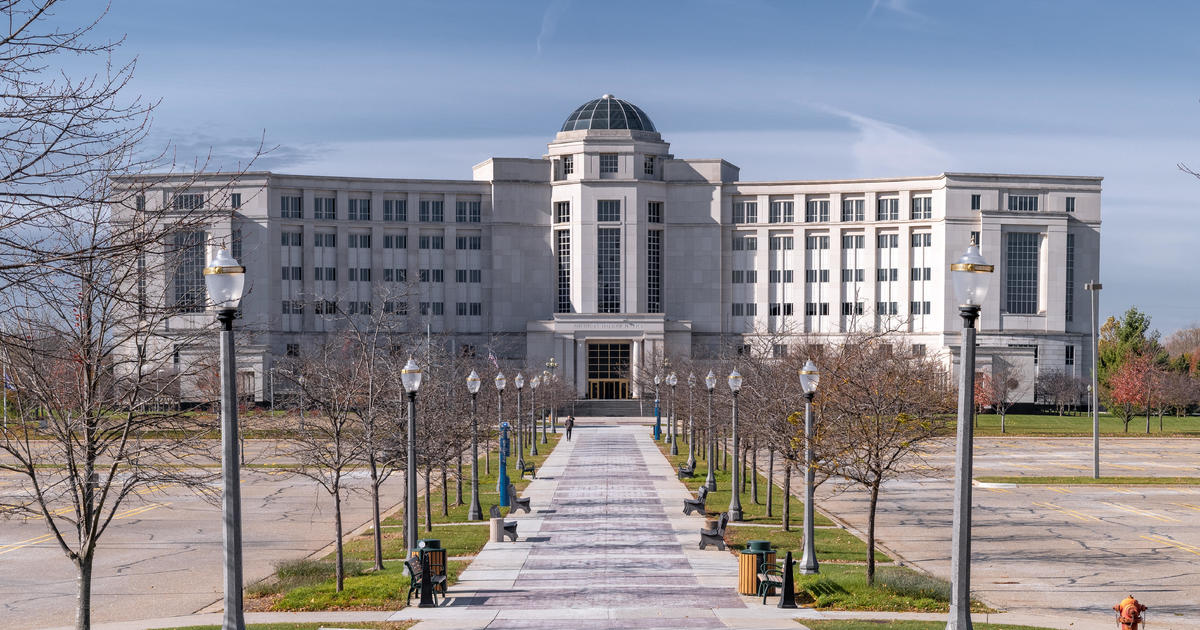Techonomy: Tech Bringing Massive Change To Manufacturing
DETROIT -- Detroit has a chance to be at the forefront of a high-tech entrepreneurial future where it's about as hard to start a manufacturing firm as it is to start a Web site today.
That was part of the future laid out by Techonomy Detroit, a combination futurists' brainstorming session and entrepreneurial conference, sponsored by the Detroit Economic Club and the Detroit Media Partnership and hosted by Wayne State University.
Techonomy Media founder David Kirkpatrick, who started holding tech business conferences while a reporter at Fortune under the name Brainstorm, said Techonomy Detroit was the first Techonomy event not held at a posh resort. He said he brought the conference to Detroit because it's symptomatic of America's damaged industrial economy and persistent unemployment.
Kirkpatrick said he's not sure Americans understand just how fundamentally technology is changing the economy, including manufacturing. He said it can be an exciting future, provided America realizes that the real employment future of manufacturing isn't Ford building a new factory, but a small business started by twentysomethings who raised money through crowdfunding and are using equipment and software that has plunged in price.
Some panelists spoke to shock, like Tim Draper, founder of the Silicon Valley venture firm Draper Fisher Jurvetson, who cracked: "You've lived off this automotive tit enough. it's time to do something else." And he contended Detroit has already lost the race for the electric car.
Draper also predicted a sci-fi future of near-infinite energy supplies, hydroponics, communication with animals and self-driving cars. (Well, that last one is nearly here already.)
Others noted that Moore's Law -- the electronics industry bromide that every 18 months, electronics fall in price by 50 percent and work twice as fast -- has hit manufacturing.
Combine that with the phenomenon of crowdfunding -- people going online to raise money for everything from indie films to in-vitro fertilization treatments -- and you have a recipe for instant factories, making custom-crafted merchandise just in time, to a dedicated, deeply involved global customer base.
"The price of CNC equipment has come down 95 percent because of Moore's Law," said Mark Hatch, CEO of Techshop, a San Francisco-based chain of manufacturing centers for do-it-yourselfers that opened a branch location last spring in Allen Park. "Software like Autodesk is so much easier to use -- we're training people in a few two or three hour sessions. So the chasm has just gotten so much smaller."
Other panelists told stories of entrepreneurs using Internet crowdfunding sites to raise money for a wide variety of businesses and doing their manufacturing in places like Techstop and Web sites like Ponoko, a Web platform for connecting inventors and plants with manufacturing capacity. Social media also allow these modern manufacturers instant and personal communication with their customers.
The Internet also means do-it-yourselfers will be able to make a living in other fields where there were formerly only a few stars and all the rest strugglers -- like music. Danae Ringelmann, co-founder of the crowdfunding site Indiegogo, foresaw a future in which moderately popular musicians would be able to make a couple hundred thousand dollars a year selling their music online. "Those people used to work in coffee shops by day and play in coffee shops by night," she said.
Other panelists said that despite its challenges -- depopulation, decentralization -- Detroit has a real sense of vibrancy and comeback these days.
"If you're downtown and take the corridor up to midtown, there's a sense of momentum here," said Bruce Katz, vice president and director of the metropolitan policy program at the Brookings Institution.
Added Janet Anderson, adjunct professor at Wayne State University and policy analyst of the city of Detroit: "I've lived in Detroit my entire life, 40 plus years now, and worked for the city for 20 years. There's a new focus on cities as the engines that built this country. Downtown looks better than I've ever seen in my life." But she also noted, "that benefit hasn't gone to the neighborhoods."
Panelist Carlo Ratti, director of the SenseAble City Lab at the Massachusetts Institute of Technology, added that Detroit reminded him of Berlin a few years ago, before a renaissance that has made it a magnet for the creative class. (Katz described today's Berlin as "poor but sexy.")
Paenlsti Vivek Kundra, executive vice president for emerging markets at Salesforce.com and former CIO of the United States, noted that "the story of America is the story of the ability of entrepreneurs to disrupt the global economy... I'm hearing too much gloom and doom. My view is this (the United States) is still the best country on the planet when it comes to starting up a business, developing an idea and access to talent."
However, Kundra also complained that the American "immigration system is broken. It makes no sense when we educate the smartest people in the world with advanced degrees then ask them to leave and start businesses elsewhere." Instead, he said, we should staple a green card to every advanced diploma.
He also said America in general and Detroit in particular haven't done nearly enough to retool the labor force, citing 3,000 IT job openings in Detroit area.
Micael Littlejohn, vice president of the IBM Smarter Cities initiative, noted that at the university level, America still is the top producer of science and tech talent in the world. In K-12, he said, there are huge inequalities, with some excellent science education and some awful science education, so that U.S. performance is "medium among developed countries."
He also noted that China's much-vaunted education of millions of science and engineering grads may be a paper tiger, since, he said, many of those students are studying engineering under government orders, and that could mean poor quality.
Ben Kaufman, founder of the indie manufacturing site Quirky, urged the crowd to "please so something other than iPhone apps." He cited a "23-year-old kid in Wisconsin who has made half a million dollars in royalties for coming up with the world's first pivoting power strip."
In another panel, Amar Hanspal, senior vice president for products at Autdesk, termed today's cars "basically computers running a drive train," which calls for different skills among automakers.
Later in the afternoon, a panel called "Why I believe In Detroit" featured four panelists who explained precisely why.
Bruce Schwartz, who carries the title Detroit relocation ambassador for Quicken Loans and Bedrock Real Estate, said the biggest obstacle to Detroit's rebirth is "perception." Tonya Allen, COO of the Skillman Foundation, agreed that "we've allowed other people to tell our story."
But Catherine Kelly, publisher of the Michigan Citizen, called the biggest barrier poverty, pointing out there are "two Detroits -- the downtown-midtown part, anchored by these great institutions, with lots of resources and lots of energy, and things are looking very hopeful for those parts of Detroit." But in the neighborhoods, she said, there's still crime, hunger and lack of education.
The day ended just as strong as it began, with Kirkpatrick interviewing Quicken Loans founder Dan Gilbert and Twitter co-founder Jack Dorsey in an often lighthearted exchange, including a discussion of how the name Twitter was chosen. (Imagine, it was almost Twitch.) (See this link. http://nyc.podcast.play.it/media/d0/d0/d1/d1/d9/dC/dG/119CG_3.MP3.)
Gilbert, for his part, said his next act in the redevelopment of downtown Detroit will be an attempt to attract more retail -- including an Apple store.
Dorsey, for his part, said Twitter was born out of his lifelong obsession with maps, and as a teenager became interested in dispatch routing programs so he could follow police and fire trucks on maps. "Twitter is just an extension of that," he said.
In fact, Dorsey said he got a job at a dispatch management services firm after seeing there was no contact information on the Web site -- but noting there was a hole in their Web server that allowed him to get in and see their email list. "I emailed the CEO and said, 'Hey, I found this hole in your server, here's how to fix it, and by the way I write dispatch software,'" Dorsey said. "A week later I was on a plane to talk to them."
Now with Twitter, Dorsey said, "I can see what the entire world is doing and what it is thinking, in real time."
Dorsey, 35, is now involved in the micropayments industry with a company called Square Inc., which offers a device that lets smartphones accept credit card payments.
If you were unable to attend Techonomy, you can watch archived video at www.techonomy.com.



